Hosting
Best Web Hosting (2020)
10 Best Hosting Services for New Websites
Below is a list of 10 best website hosting providers that we’ve found reliable and with good speed. They have all performed well in the last 24-months.
1. Bluehost – Best Overall

Bluehost Pros
+ Best uptime (99.99%)
+ Top 5 speed (405 ms)
+ One-Click-Install for WordPress
+ Easy to use, beginner-friendly
+ Free domain and site builder
+ 24/7 support (chat and phone)
Bluehost Cons
– Discounts for longer plans only
2. Hostinger – Cheapest Price

Hostinger Pros
+ Top 2 load time (350 ms)
+ Cheap pricing ($0.99/mo)
+ Datacenters in US, Europe & Asia
+ Free SSL certificate
+ 24/7 support chat
Hostinger Cons
– No free domain
– Limited bandwidth on the cheap plan
03. GreenGeeks – Best “Green” Hosting

GreenGeeks Pros
+ Good load time (445 ms)
+ Stable uptime (99.98%)
+ US, Canada & Netherlands servers
+ Free site transfer
+ Unlimited bandwidth and storage
GreenGeeks Cons
– Questionable refund policy
– High renewal cost
04. SiteGround – Best Customer Support
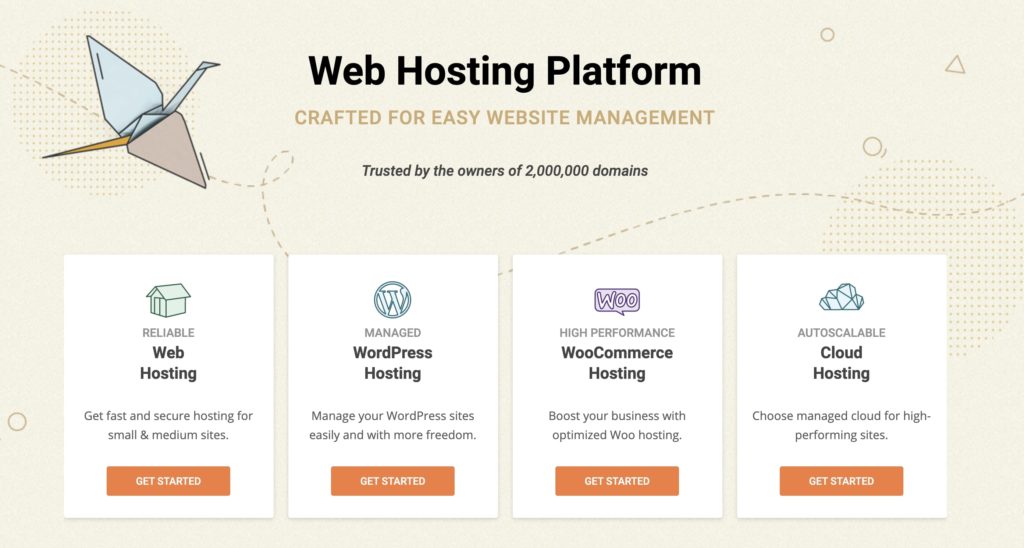
SiteGround Pros
+ Sufficient load time (673 ms)
+ Stable uptime (99.99%)
+ Knowledgable customer support
+ 24/7 “Guru” chat support
+ 20+ email accounts
SiteGround Cons
– Setup fee on monthly plans
– Limited cheap plan
05. A2 Hosting – Fastest Shared Hosting
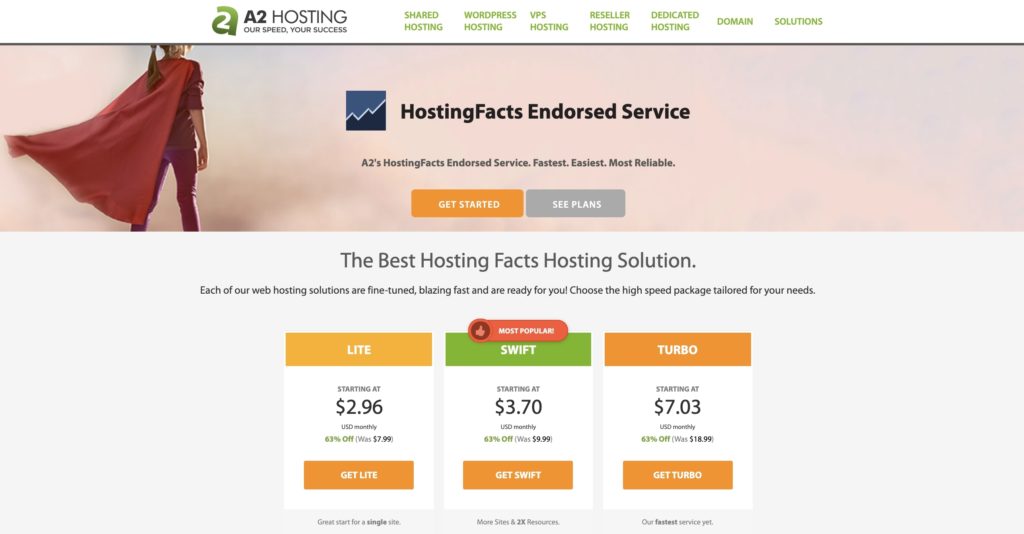
A2 Hosting Pros
+ Fastest load time (317 ms)
+ WordPress optimized servers
+ Unlimited bandwidth and storage
+ 24/7 “Guru” chat support
+ 20+ email accounts
A2 Hosting Cons
– Average uptime (99.93%)
– Higher renewal cost
06. WestHost

WestHost Pros
+ Good uptime (99.98%)
+ Cheap pricing
+ Free Cloudflare CDN
+ Backups included
WestHost Cons
– Below average load time (881 ms)
– SSL/free domain not included
– No cPanel or auto-installs
07. GoDaddy Hosting

GoDaddy Pros
+ Good load time (554 ms)
+ Good uptime (99.97%)
+ 100GB website storage
+ cPanel and website builder access
+ Uptime guarantee for 99.90%
GoDaddy Cons
– SSL & email costs extra
– No site transfers
08. Site5
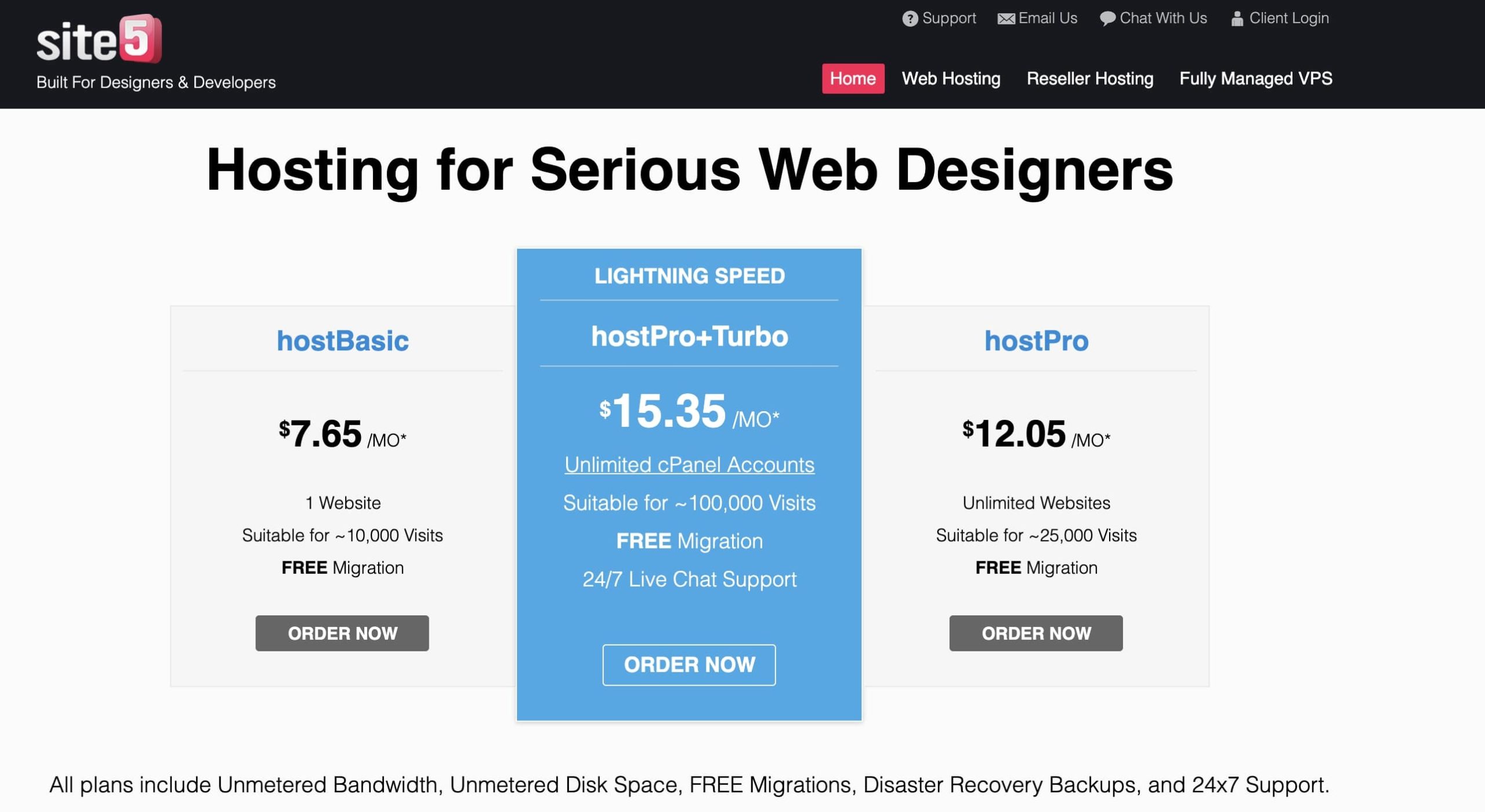
Site5 Pros
+ Good uptime (99.99%)
+ Above average speed (629 ms)
+ Free migrations
+ Unmetered bandwidth/storage
Site5
– Expensive pricing
– Limited cheap plan (10,000 visits max)
– Domain not free
09. HostGator Cloud – Best Cheap Cloud
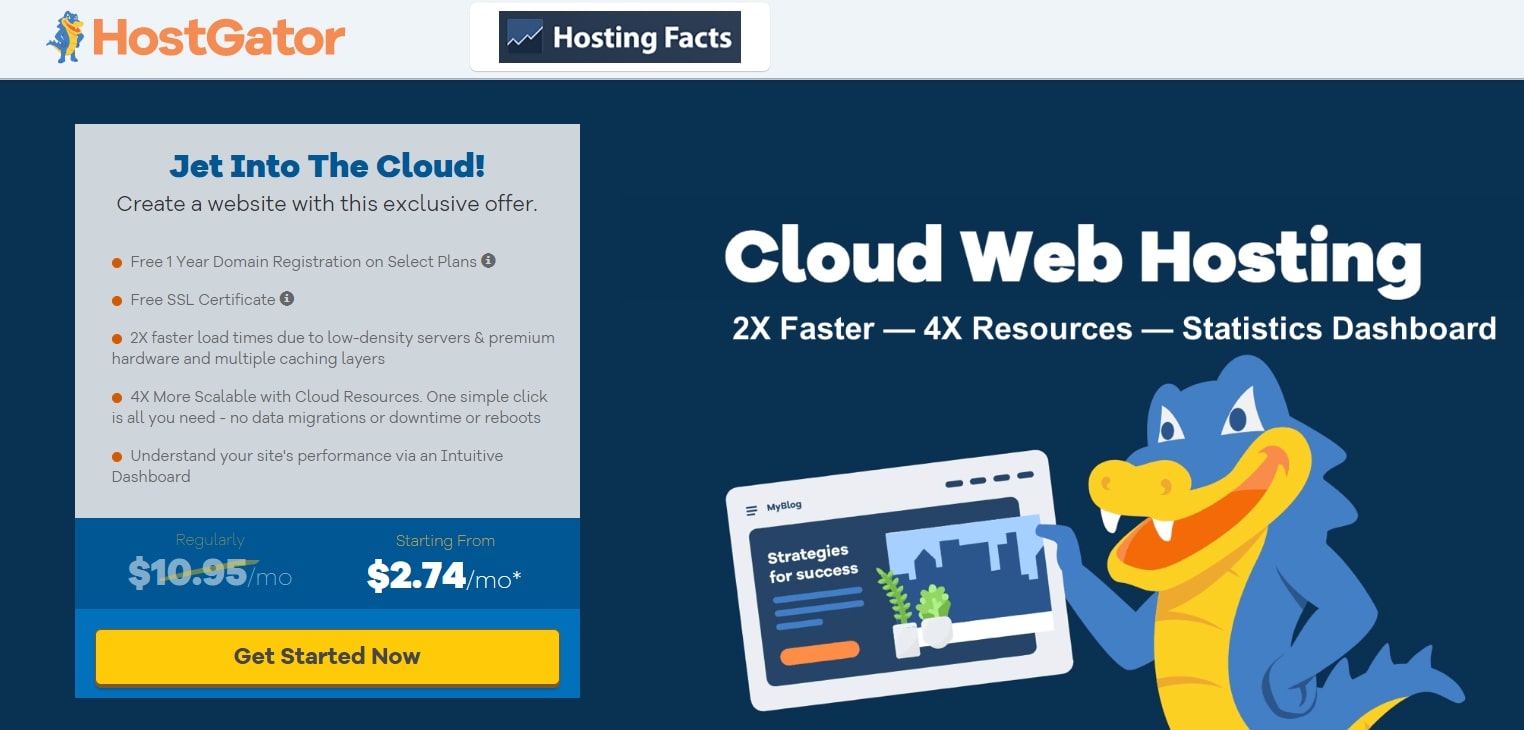
HostGator Cloud Pros
+ Top 5 uptime (99.99%)
+ Top 5 speed (399 ms)
+ Free website transfer
+ No bandwidth and storage limit
+ Multiple datacenter locations
+ Unlimited email accounts
HostGator Cloud Cons
– Higher renewal cost
10. DreamHost – Pay Monthly, No Higher Renewals

DreamHost Pros
+ Good load time (648 ms)
+ Uptime guarantee
+ Monthly plans available
+ 97-day money back guarantee
+ Unlimited bandwidth and storage
Dreamhost Cons
– Average uptime (99.94%)
– No cPanel
30+ Hosting Reviews & Statistics
Each year we will slowly add more hosting providers to the list as soon as we have enough data on their performance (uptime and load time). Here’s a link to the spreadsheet – web hosting comparison chart (2020).
Things to Consider When Choosing Web Hosting
1. Site Transfers And Migrations Are Not Always Free
What if you pick a web host only to discover that you don’t like it? Site transfer, also known as site migration, allows you to move your website to another host.
Moving to another website consists of transferring the website’s files and databases, configuring your site with the new host, and directing your domain’s DNS to the new host. Once you pick a new site host, they can usually help you out with this process. The cost will depend on the host you’re switching to, but it can range anywhere from $150-$400.
But some web hosts on our list, like HostGator and GreenGeeks, offer free web transfers.

For paid transfers, you can sometimes transfer more than one site. For example, it’s $149.99 to migrate 5 websites and 20 email accounts to Bluehost. The site transfer will usually take a few days.
For a host like HostPapa, it will take 5 to 7 days to complete a site transfer. They recommend modifying DNS entries before starting the transfer so that it takes less time. They can also update your DNS entries, but this service will add 24 to 72 hours before your site becomes live. With A2 Hosting, it’ll take anywhere from 2 to 4 days.
2. Renewal Rates Are Usually Higher
Most web hosting providers double or triple their price once it’s time to renew your deal. The renewal fees can jump to $7-10/mo for a basic plan that initially costs $2.99/mo. The features and performance you get from the plan stay the same, but you’ll have to pay more.
- For example, GoDaddy’s Economy plan will jump to $8.99/mo once it’s time to renew.
- A2 Hosting requires customers to submit a written cancelation request 15 days before the beginning of the renewal. However, if you forget to request cancellation your renewal will automatically start and the price will be doubled.
- However, some of the web hosting providers on our list don’t follow this industry-standard trick. If you sign-up for a three-year plan with DreamHost your plan will renew on the same pricing.
Furthermore, while most web hosting providers offer “free domain” – what it means is that you get the domain for the first year free. After that, it usually renews yearly somewhere between $10 – $20/year.
3. Bandwidth, Storage, And Email Account Limits
When it comes to bandwidth and storage there are also limitations.
- GoDaddy’s cheapest plan provides users with unmetered bandwidth and 100 GB storage which is enough for a single website.
- Hostinger offers 100 GB bandwidth and 10 GB storage, while iPage offers scalable bandwidth and unlimited MySQL databases.
- Customers interested in unmetered bandwidth and storage should check out Bluehost, HostGator, SiteGround, and GreenGeeks.
Website owners interested in hosting providers that offer free SSL should consider using Bluehost, DreamHost, HostGator, SiteGround or iPage. They all include a free SSL certificate in all their hosting plans which is not always the case with major hosting providers. For example, GoDaddy charges very high fees for SSL certificates.
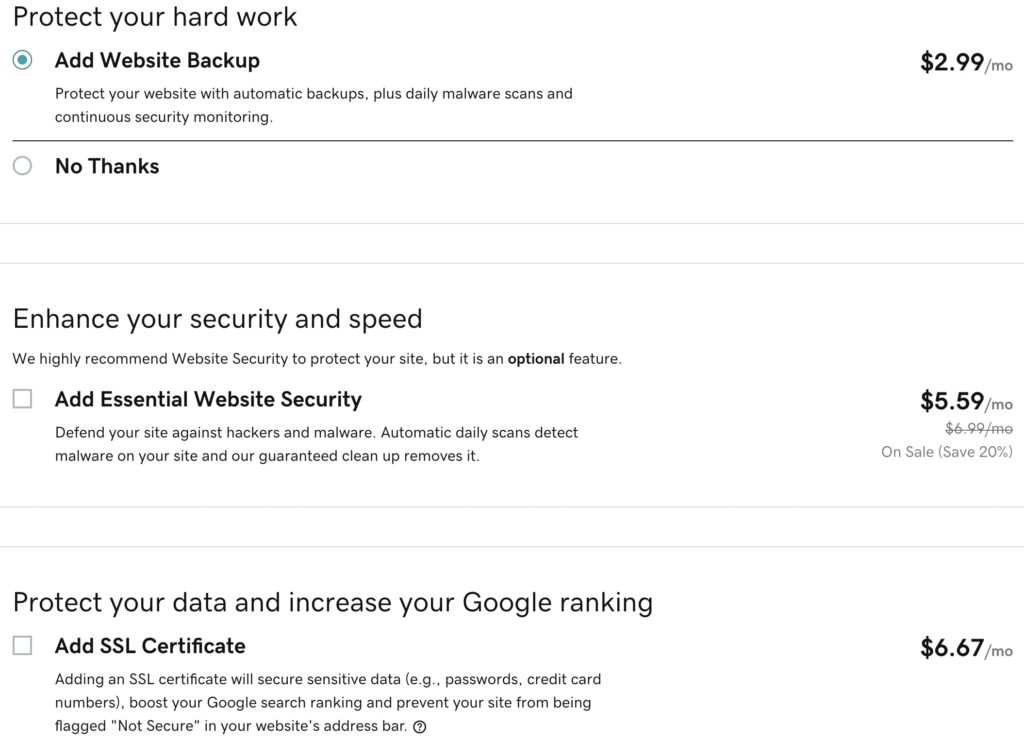
When it comes to email accounts, web hosting solutions differ in their offers.
- For example, all SiteGround, HostGator, A2 Hosting and Hostinger hosting accounts include a free email account.
- GoDaddy includes a free business email for the 1st year with their basic plan. The Microsoft Office 365 mailbox comes with 5GB of dedicated storage and a shared online calendar.
- iPage and GreenGeeks let users create unlimited email accounts. They are branded for the user domain and include email forwarding and autoresponders.
4. Once Your Site Grows, Consider Changing Your Hosting Plan
Web hosting providers offer different hosting types. If you are just starting out or have a low-traffic website, you should opt-in for shared web hosting. It’s more than enough to maintain and run your website(s). However, once your site(s) grows, it’s easy to migrate from one hosting to another or upgrade to more expensive web hosting.
Shared web hosting – Best for new websites and blogs. All websites are stored on one physical hosting server where they share server resources like storage, bandwidth, RAM and computing power. If your website doesn’t get much traffic, this is the best place to start. Jump back to our top 10 list.
VPS hosting – VPS stands for a virtual private server. Although VPS is similar to shared hosting (speed and uptime wise) and it stores multiple websites on the same server, it provides more customization options and you’ll have more control. With VPS you can scale your resources based on your needs.
Cloud hosting – Type of hosting service which allows many computers to work together, run applications, and use combined computing resources. Cloud-hosted websites can use the resources of multiple servers, which means they’re not limited to a single server location.
Managed WordPress – Best for high traffic WordPress sites. WordPress managed hosting covers the same hosting needs as general web hosting services, however, its main focus is to optimize the performance of a WordPress site.
Dedicated hosting – Best for big, enterprise websites. Type of hosting server that gives website owners the resources of one entire server for their website. This type of hosting provides websites with the ability to handle large amounts of traffic and the ability to customize it to their needs in terms of CPU, RAM, disk space, and software.